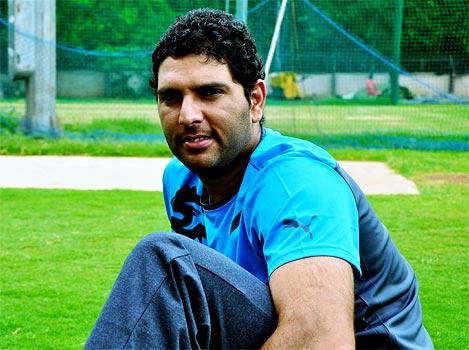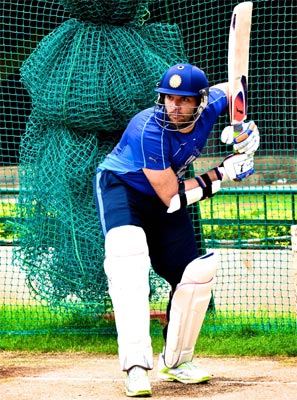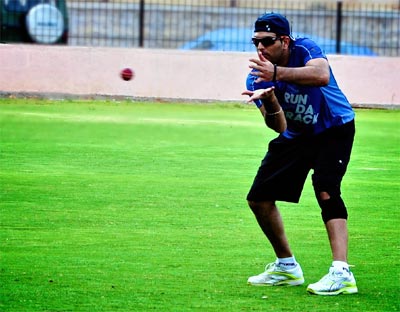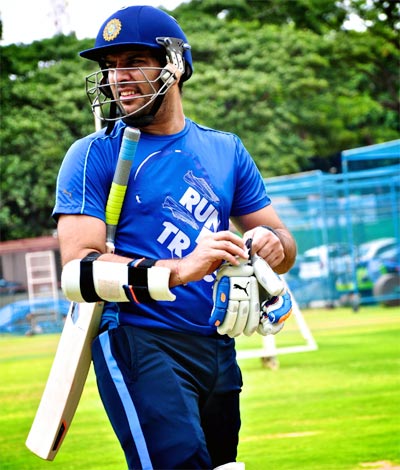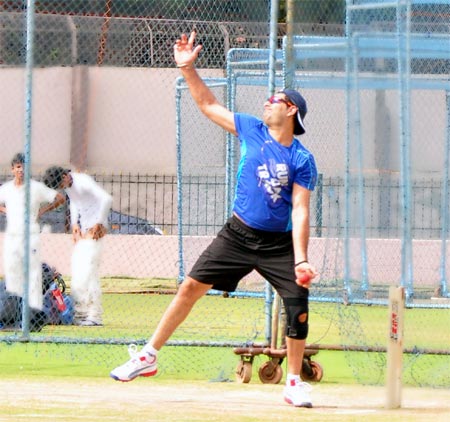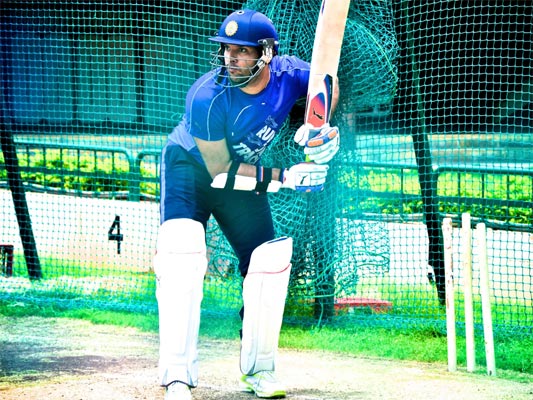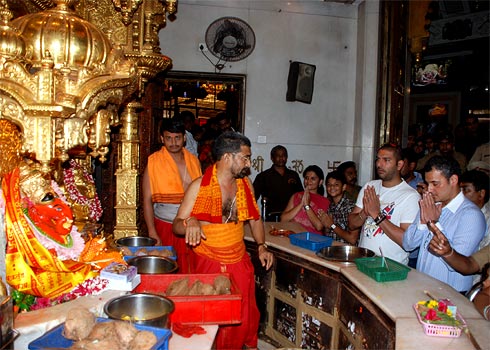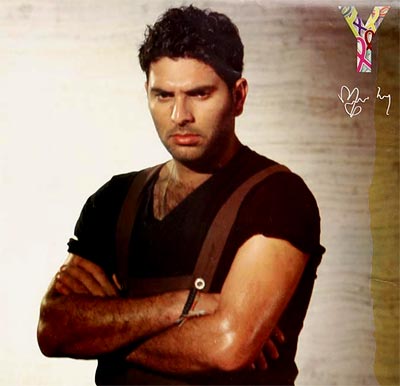 | « Back to article | Print this article |
'I have worked very hard in the last three-four months to get fit'
Yuvraj Singh is regarded as India's biggest match-winner. Be it any situation, or any opponent, you could always bank on him to see the team through with the bat. His heroics helped India win the Under-19 World Cup in 2000, the Twenty20 World Cup in 2007 and the 50-overs' World Cup in 2011.
However, he faced the toughest battle of his life off the field when he was diagnosed with cancer in the lungs in February, but, again, emerged a winner after undergoing three sessions of chemotherapy at the IU Simon Cancer Centre at the Indiana University Medical Centre in Indianapolis, under Dr. Lawrence H Einhorn, the same doctor who helped Lance Armstrong's recovery from cancer in 1996.
Yuvraj played his last match in November, the second Test against the West Indies in Kolkata. After that 'The Prince' spent a few months recovering from cancer before returning to India in April. Now, he is working hard to make a comeback to his first love -- cricket. His 'second innings' in the game begins with the first of the two-match T20 series against New Zealand on September 8, followed by the T20 World Cup in Sri Lanka later this month.
In between preparing to get back to cricket, the left-hander also found time to launch 'YouWeCare', a foundation that will help create awareness of cancer in India and also eradicate misconceptions about the dreaded disease.
In an exclusive interview with Harish Kotian, the dashing 30-year-old batsman reveals his excitement on making a comeback to the Indian team, his battle against cancer and what kept him going through the tough times.
With just a couple of days to go for your comeback, what's going on in your mind? This will be your first match after a long time, having recovered from cancer?
I just can't wait to step on the field and get started. I have worked very hard in the last three-four months to get my body back in shape and fit. I can't wait to play for India again.
'I am nervous, but very excited also'
Are you more nervous than you were before you played your first match for India way back in 1998?
Yes, I am more nervous now, but very excited also. Let's see how I do on September 8th, but I am not worried how much I will score or what I do. I just want to go out in the middle and play for India again.
For me, it is more important to enter the field, and I just can't wait to do that. I am very thankful to my family, friends and the people of India who prayed for me.
How big a moment will it be for you just to get back on the cricket field?
It will be a huge moment in my life. I can't wait for Saturday; everyday I keep counting seven days, six days ... I just can't wait to get back on the field. I just can't wait for the excitement, can't wait to get back on the crease, hold my bat and take leg stump guard. I just can't wait to stand on the field at the point region or anywhere in the field.
I just can't wait to get to that environment, because that is one environment I am very used to. That is something I have been doing for the last 17-18 years, since I was a small child. When that was taken away from me it was a shock. Just a couple of more days to go and I just can't wait for it.
I just can't express how it will be for me when I enter the field of play.
'I am happy I have my life back'
Was cricket the biggest motivating factor that inspired you during your tough battle?
Cricket is my life, and I was thinking that if I am able to make a successful recovery then I want to play for India again. That thought motivated me during my treatment. I used to watch all the matches that India played from the hospital and would get frustrated.
How would you describe life before cancer and after it? How did your thinking change?
Before cancer life was happy-go-lucky and I was just going with the flow. There was a lot of tension about the future, career and how to become a better player, whether I would score runs, whether I would take wickets, whether I would win matches.
But, suddenly, when you are diagnosed with cancer you just think about saving your life and everything just falls back. When you come back after saving your life you think about living a few more years. The thinking completely changes and I am very thankful to God for saving my life. You are happy to be breathing again normally, happy to be eating again normally, happy to sit with my family and friends with no stress on my mind.
Cricket is something which I love; it is my passion and I have another opportunity to play again, but I am happy that I have my life back. I have people who are care about me with me to support me, so it is a happy feeling.
'Sometimes I used to get low and cry a lot'
Was there a time during your battle with cancer when you felt you might not win it and not play cricket again?
Yes, there were times when I felt the chemo was getting tough on my body and spoiling it. There were dull times and negative thoughts came to my mind, but I always believed that I have the strength and courage to beat it. I kept thinking that the drugs are making me worse -- though it was eventually good for me -- and one day I will come out of it stronger.
There were dull times, but I think I always had the one thought in my mind that I am going to go back and play for India one day.
Sometimes when you take strong drugs there is a lot of depression; you feel dejected and sad. Sometimes I used to get low and cry a lot. The people around me gave me a lot of confidence and helped me through the times.
At some point did the thought also come to your mind that you not make it at all?
When I went for my diagnosis, while I was getting detected and the doctors told me this was the issue. They said if they you take these medicines there are chances you may have liver failure; or if you take this medicines, you might get kidney failure or your reproductive organs might fail.
They also said that if you take this medicine then there are chances you might not be able to hear the voices of women or small children. I told the doctor that this is a very good side effect to get. It was difficult and I was not sure if I could come out of alive but I was always positive and always believed that I would come out of it.
'My motive is to save a lot of lives'
Has this successful battle from cancer made you a stronger human being mentally and physically?
I think this battle has made me stronger. When you win a battle like this, it is like winning a war; so when you come of it, you feel very confident of yourself and you are also very happy to get your life back and see the future.
I am not really going to be stressed about how I am going to perform. Yes, I want to go on the field and perform, but there is no stress. Maybe, I will score one run or score 100 runs; I am just happy to come back and get an opportunity to play.
And now, along with cricket my motive is to save a lot of lives, to urge people to get tests done early to detect it early if they get any symptoms, go door to door and press for detections, go to small towns and help poor people to save their lives.
'I could not stop hugging Sachin'
Your former team-mate Anil Kumble and close friend Ranvijay Singh came to see you in the hospital in the US, while Sachin Tendulkar met you in London when you went there for a few days to recover after your treatment. How much did meeting them help you?
It was special to meet them. Anil Kumble came to meet me in the hospital and gave me a lot of motivation. I used to follow India's matches on the Internet and wonder if I would play again, but he took the laptop away from me and told me to focus on my treatment and think of cricket after that.
Ranvijay also visited me, and so many other people who matter to me came to visit me. When I met Sachin in England I just could not stop hugging him.
Lance Armstrong also motivated me a lot. There is so much talk of Armstrong recently, but somebody who has battled that kind of cancer and come back so strongly and won seven-eight Tour de France titles, he is a real hero and a real inspiration for all of us. I didn't read Lance Armstrong's book at the start, but I read it later on and it was inspiring.
In that time, there were a few people around, but only the people who mattered. It was important that all my friends didn't pity me or sympathise with me; they were all motivating me to come out of this stronger. They made me feel happy and made sure I was smiling. I am also a happy-go-lucky guy, so I was trying to be happy all the time.
'I didn't know whether I would survive or not'
What was your first reaction when the news was broken to you that you had cancer?
I was shattered when I first heard that I had cancer. I didn't know whether I would survive or not. As I understood cancer more, read about it, and when I got my diagnosis and was going through my treatment, the doctor said I would be fine. Slowly I got the confidence that I would be okay one day, but it was a very tough for me.
How difficult was this phase of your life when you had battle a disease like cancer?
I think it was very tough on me. It was not easy to accept that I had cancer; I was denying it. But I had to go through it because I had no other choice. The chemotherapy was very tough on the body and it took me a long time to recover from it. It takes a toll on you, physically and mentally, but I am glad that it cured me and I am back on the field again. It was quite a hectic journey for me and tough time.
'YouWeCan has been formed for cancer awareness'
You have started a foundation named YouWeCan to educate people on cancer and help them detect it early, because that is crucial in saving lives?
YouWeCan has been formed for cancer awareness and to make people understand what the disease is all about and give them information. People think if they are diagnosed with cancer then they will die, but that is not the case. We will organise various events through YouWeCan that will help us reach out to the people. We are starting by having my documentary aired on Colors television, which will show how I battled cancer and overcame it. I hope it will inspire a lot of people.
Then we will have YouWeCan apps on Microsoft mobiles and Nokia Lumia mobiles, which will give information on cancer. So we are planning lot of things for YouWeCan. I will also ask my team-mates during the two Twenty20 matches against New Zealand to wear the YouWeCan logo on their shirts, which will again bring awareness about my foundation.
